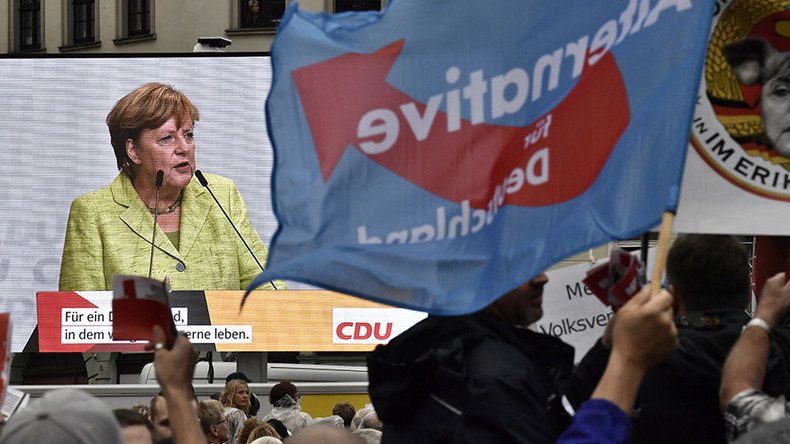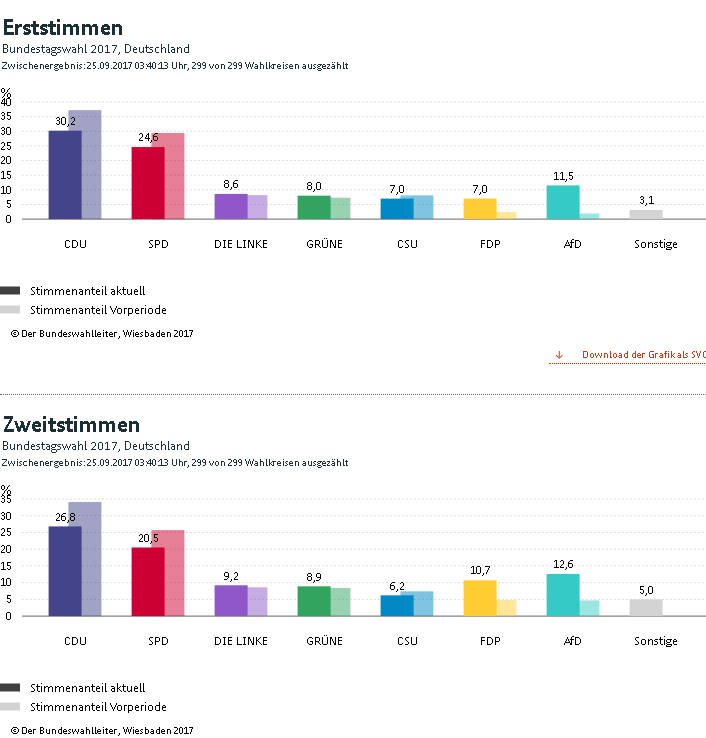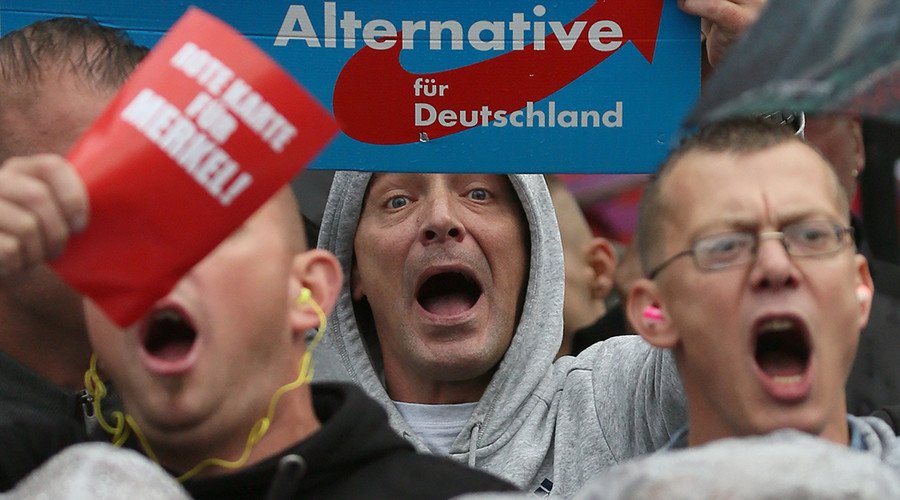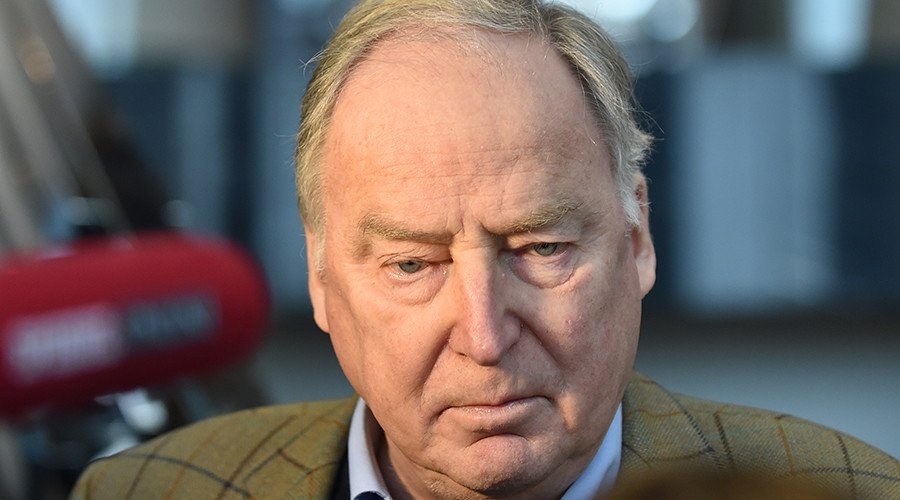German election results: AfD enters parliament with record-high 12.6% as Merkel’s alliance gets 33%

With 33 percent of the votes, Angela Merkel’s CDU/CSU alliance won a plurality in the German parliamentary elections. However, results showed record-low support for Germany’s major parties, while the anti-immigrant AfD placed third and got its first MPs.
25 September 2017
11:16 GMTThe ‘Jamaica coalition’ – a combination of the CDU, the Free Democrats (FDP), and the Greens – option has been ruled out by one of the parties. The deal between the three parties was seen as promising, as SDP leader Martin Shultz had earlier vowed to join the opposition.
The deputy leader of the liberal FDP said, however, that they would not agree to a deal with Merkel.
“It is not up to us to form a ‘Jamaica coalition’ at any price,” deputy party leader Wolfgang Kubicki told journalists on Monday, as cited by Reuters.
- 09:28 GMT
AfD Co-chair Frauke Petry said during a press conference that “after lengthy consideration” she won’t be joining her party’s contingent in the new parliament. According to preliminary official results, the AfD will enter the Bundestag for the first time in the party’s history.
Petry’s announcement caught the AfD’s leading candidates Aleksander Gauland and Alice Weidel, by surprise, along with Co-chair Jörg Meuthen, all of whom were present at the press conference. Meuthen described it as a “bombshell,” saying he “had no knowledge.”
Having won a direct mandate in her Saxony constituency, Frauke said she would still serve as an MP.
- 04:00 GMT
The newly elected German parliament will see a significant expansion, from 631 seats in 2013 to 709 in the next legislature, according to the estimates published by the official electoral authority. Merkel’s CDU (Christian Democratic Union) will keep 200 seats, 55 fewer than it had previously. Its Bavarian ally, the CSU (Christian Social Union), lost 10 seats, taking 46.
The centrist SPD (Social Democratic Party) has also lost ground and will take 153 seats, as opposed to 193 in the outgoing legislature. The right-wing Alternative for Germany (AfD) is entering parliament for the first time with 94 deputies, while the FDP is making its return with 80.
A total of 69 seats went to The Left party, and 67 to Alliance 90/The Greens party.
- 03:12 GMT
Contrasting scenes of protests and celebrations related to the anti-immigrant Alternative for Germany (AfD) party’s election performance have been filmed by RT’s Ruptly agency.
At AfD’s Berlin headquarters, AfD member and MEP Beatrix von Storch proclaimed “no less than a political revolution” that she said the party and its supporters had started.But AfD’s election party in Berlin was also surrounded by a crowd of protesters, who shouted anti-nationalist and pro-refugee slogans for hours, even after the party members were reportedly led away with the assistance of police.
Meanwhile, in Cologne, several hundred anti-fascist protesters marched through the streets to protest the AfD’s anti-immigrant policies. Similar rallies took place in Frankfurt, Hamburg, Munich and Düsseldorf. - 02:05 GMT
With a 33 percent combined vote, the alliance of Angela Merkel’s Christian Democratic Union (CDU) and its Bavarian sister party, the Social Christian Union (CSU), won a plurality of the votes in the German parliamentary elections, the federal election authority announced.
However, for both the CDU/CSU and their closest rival, the Social Democratic Party (SPD), which gained 20.5 percent of the vote, the results were the worst in over 60 years.
Coming in third and entering the Bundestag for the first time is the anti-immigrant Alternative for Germany (AfD) party, which secured 12.6 percent of the vote, according to the final results.
The Liberal Free Democratic Party (FDP) placed fourth with 10.07 percent of vote, which allowed it to reenter parliament after a disastrous result in 2013, when it failed to pass the 5 percent threshold.

- 01:50 GMT
With ballots in 297 out of 299 constituencies counted, one of the surprises of the night was the preliminary lead of the anti-immigrant Alternative for Germany (AfD) party in the state of Saxony. The far-right AfD narrowly beat Angela Merkel’s Christian Democratic Union (CDU) in its share of proportional second votes, regarded as more important for the distribution of seats in Bundestag. The AfD received 27 percent against the CDU’s 26.9 percent, the Federal Returning Officer reports.
Germany, 274/299 counted:
— Europe Elects (@EuropeElects) September 24, 2017
Dark blue: CDU-EPP
Blue: CSU-EPP
Red: SPD-S&D
Light blue: AfD-ENF#btw17#wahl17pic.twitter.com/g5fNUgBcCk 24 September 2017
20:55 GMTSahra Wagenknecht, the leader of the Left Party, blamed Angela Merkel’s CDU and the Social Democrats for the success of the Alternative for Germany (AfD) but also praised her own party for what she called the second-best election result.

- 20:47 GMT
The Greens’ co-chair, Cem Ozdemir, ruled out any potential coalition with Angela Merkel’s CDU and the Free Democrats by saying that his party would not take part in what he called "anti-European populism." At the same time, the second party co-chair, Katrin Goering-Eckardt, did not rule out a coalition as she said that the party leadership will “see if there can be cooperation."
- 20:40 GMT
The co-chair of the right-wing populist Alternative for Germany, Alexander Gauland, vowed to “chase” the future German government and “take back our country and our people,” adding that the government should be preparing for “tough times.”

- 20:38 GMT
The right-wing Alternative for Germany (AfD) party secured as many as 21.6 percent of votes in regions in the former East Germany, thus becoming the second most popular political force there after only Angela Merkel’s Christian Democrats, German public broadcaster ARD reports, citing exit polls.













